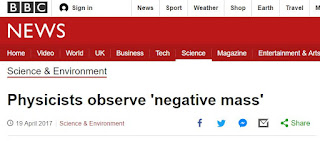 |
| [img src: gamedesigndojo.com] |
To begin with, it’s an idiotic stance towards journalism in general – basically a permission for journalists to write nonsense. Just imagine having the same attitude towards articles on any other topic, say, immigration: Simply shrug off whether the news accurately reports survey results or even correctly uses the word “immigrant.” In that case I hope we agree that not all publicity is good publicity, neither in terms of information transfer nor in terms of public engagement.
Besides, as United Airlines and Pepsi recently served to illustrate, sometimes all you want is that they stop talking about you.
But, you may say, science is different. Scientists have little to lose and much to win from an increased interest in their research.
Well, if you think so, you either haven’t had much experience with science communication or you haven’t paid attention. Thanks to this blog, I have a lot first-hand experience with public engagement due to science writers’ diarrhea. And most of what I witness isn’t beneficial for science at all.
The most serious problem is the awakening after overhype. It’s when people start asking “Whatever happened to this?” Why are we still paying string theorists? Weren’t we supposed to have a theory of quantum gravity by 2015? Why do physicists still don’t know what dark matter is made of? Why can I still not have a meaningful conversation with my phone, where is my quantum computer, and whatever happened to negative mass particles?
That’s a predictable and wide-spread backlash from disappointed hope. Once excitement fades, the consequence is a strong headwind of public ridicule and reduced trust. And that’s for good reasons, because people were, in fact, fooled. In IT development, it goes under the (branded but catchy) name Hype Cycle
 |
| [Hype Cycle. Image: Wikipedia] |
There isn’t much data on it, but academic research plausibly goes through the same “through of disillusionment” when it falls short of expectations. The more hype, the more hangover when promises don’t pan out, which is why, eg, string theory today takes most of the fire while loop quantum gravity – though in many regards even more of a disappointment – flies mostly under the radar. In the valley of disappointment, then, researchers are haunted both by dwindling financial support as well as by their colleagues’ snark. (If you think that’s not happening, wait for it.)
This overhype backlash, it’s important to emphasize, isn’t a problem journalists worry about. They’ll just drop the topic and move on to the next. We, in science, are the ones who pay for the myth that any publicity is good publicity.
In the long run the consequences are even worse. Too many never-heard-of-again breakthroughs leave even the interested layman with the impression that scientists can no longer be taken seriously. Add to this a lack of knowledge about where to find quality information, and inevitable some fraction of the public will conclude scientific results can’t be trusted, period.
If you have a hard time believing what I say, all you have to do is read comments people leave on such misleading science articles. They almost all fall into two categories. It’s either “this is a crappy piece of science writing” or “mainstream scientists are incompetent impostors.” In both cases the commenters doubt the research in question is as valuable as it was presented.
If you can stomach it, check the I-Fucking-Love-Science facebook comment section every once in a while. It's eye-opening. On recent reports from the latest LHC anomaly, for example, you find gems like “I wish I had a job that dealt with invisible particles, and then make up funny names for them! And then actually get a paycheck for something no one can see! Wow!” and “But have we created a Black Hole yet? That's what I want to know.” Black Holes at the LHC were the worst hype I can recall in my field, and it still haunts us.
Another big concern with science coverage is its impact on the scientific community. I have spoken about this many times with my colleagues, but nobody listens even though it’s not all that complicated: Our attention is influenced by what ideas we are repeatedly exposed to, and all-over-the-news topics therefore bring a high risk of streamlining our interests.
Almost everyone I ever talked to about this simply denied such influence exists because they are experts and know better and they aren’t affected by what they read. Unfortunately, many scientific studies have demonstrated that humans pay more attention to what they hear about repeatedly, and we perceive something as more important the more other people talk about it. That’s human nature.
Other studies that have shown such cognitive biases are neither correlated nor anti-correlated with intelligence. In other words, just because you’re smart doesn’t mean you’re not biased. Some techniques are known to alleviate cognitive biases but the scientific community does not presently used these techniques. (Ample references eg in “Blind Spot,” by Banaji, Greenwald, and Martin.)
I have seen this happening over and over again. My favorite example is the “OPERA anomaly” that seemed to show neutrinos could travel faster than the speed of light. The data had a high statistical significance, and yet it was pretty clear from the start that the result had to be wrong – it was in conflict with other measurements.
But the OPERA anomaly was all over the news. And of course physicists talked about it. They talked about it on the corridor, and at lunch, and in the coffee break. And they did what scientists do: They thought about it.
The more they talked about it, the more interesting it became. And they began to wonder whether not there might be something to it after all. And if maybe one could write a paper about it because, well, we’ve been thinking about it.
Everybody who I spoke to about the OPERA anomaly began their elaboration with a variant of “It’s almost certainly wrong, but...” In the end, it didn’t matter they thought it was wrong – what mattered was merely that it had become socially acceptable to work on it. And every time the media picked it up again, fuel was added to the fire. What was the result? A lot of wasted time.
For physicists, however, sociology isn’t science, and so they don’t want to believe social dynamics is something they should pay attention to. And as long as they don’t pay attention to how media coverage affects their objectivity, publicity skews judgement and promotes a rich-get-richer trend.
Ah, then, you might argue, at least exposure will help you get tenure because your university likes it if their employees make it into the news. Indeed, the “any publicity is good” line I get to hear mainly as justification from people whose research just got hyped.
But if your university measures academic success by popularity, you should be very worried about what this does to your and your colleagues’ scientific integrity. It’s a strong incentive for sexy-yet-shallow, headline-worthy research that won’t lead anywhere in the long run. If you hunt after that incentive, you’re putting your own benefit over the collective benefit society would get from a well-working academic system. In my view, that makes you a hurdle to progress.
What, then, is the result of hype? The public loses: Trust in research. Scientists lose: Objectivity. Who wins? The news sites that place an ad next to their big headlines.
But hey, you might finally admit, it’s just so awesome to see my name printed in the news. Fine by me, if that's your reasoning. Because the more bullshit appears in the press, the more traffic my cleaning service gets. Just don’t say I didn’t warn you.










